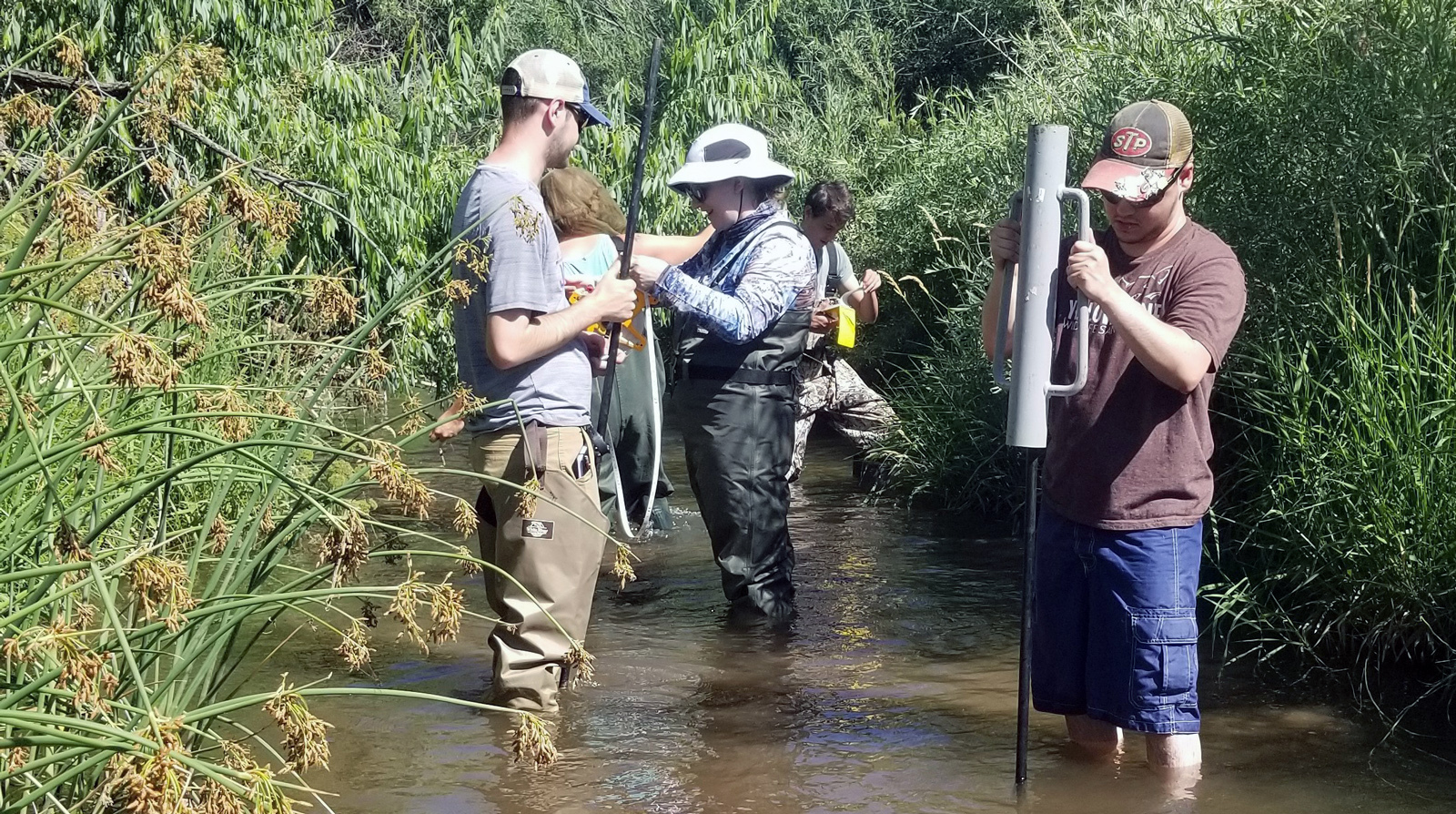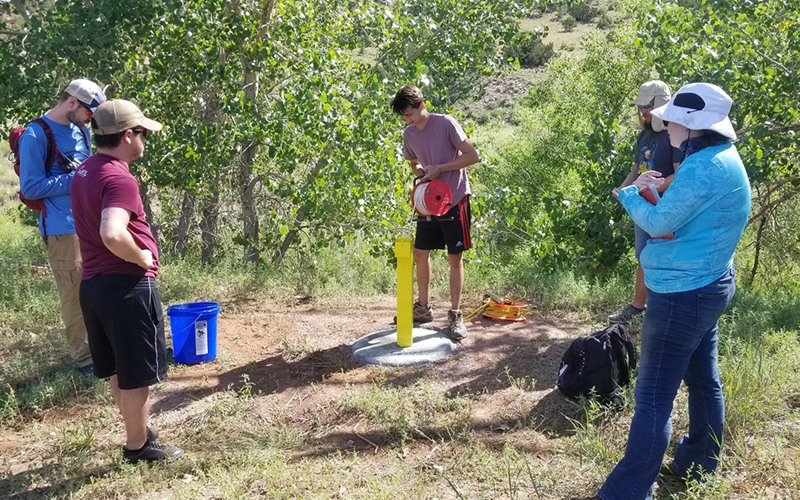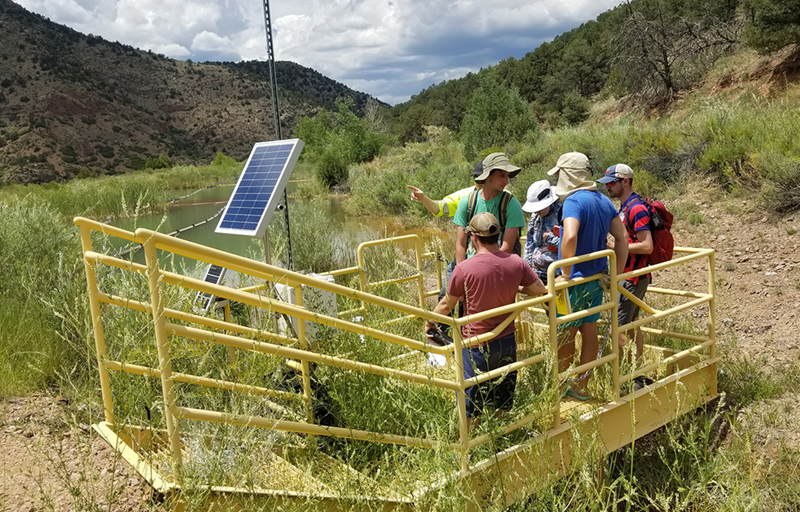For 100 years, KU’s Colorado field station provides geology students with valuable hands-on experience

Every year, KU Geology students take part in a century-long tradition – learning geology in a remote, mountainous area 35 miles north of Cañon City, Colorado.
This past July, Marcia Schulmeister, professor and director of the Professional Science Master’s in Environmental Geology program, created and taught a new environmental hydrogeology course at KU’s field station, allowing graduate and undergraduate geology students to gain valuable hands-on experience in the subject.
What is hydrogeology and why is it important?
Hydrogeology is a subset of geology that deals with the distribution and movement of groundwater through the soil and rocks of the Earth’s crust. The work of the hydrologist is unlocking the information that groundwater carries. Hydrogeologists can find the places where water filters into the ground, what sediments and bedrock it filters through, and how the water interacts with those minerals. The study of hydrogeology is key to discovering underground sources of creeks and rivers and identifying groundwater contaminants that need be blocked off or purified.
Water is one of our most important – and drastically limited – resources. As climate change accelerates, rivers are drying up and groundwater is retreating deeper into the earth. At the same time, chemical waste, both old and new, is leaching into groundwater and surface water, affecting all living creatures that rely on it.
Hydrogeologists are fundamentally important and desperately needed to help keep water pure and create sources of fresh water to those who need it.
A field camp perfect for geology students
Purchased in 1922, the newly named Robert P. Harrison Field Station has been used by KU’s geology department to conduct various geological studies. The area has an especially diverse group of rock exposures and types that are easily accessible to the geology students.
“Our camp is located steps away from a mountain stream that we can access at any time and leave equipment set up at,” says Marcia Schulmeister, Professor in the Department of Geology and Director of the PSM-EG.
The field station is located near the Cripple Creek & Victor Gold Mine, an active mine known as the richest in Colorado history. They’re also close to a contaminated groundwater Superfund site where uranium was milled for yellowcake (a solid form of mixed uranium oxide) in the 1960s and 1970s, releasing radioactive materials and heavy metals into area ponds.
Students in the environmental geology program met with local environmental professionals for a close-up look at how Superfund investigations and mining operations managed their water resources and how this affected the local water supplies over the years.
State-of-the-art tech for strategic environment assessment
Technology has changed drastically over the past one hundred years. Students in this year’s hydrogeology field course successfully coordinated the drilling of two wells using drilling rigs with hollow-stem augers and split spoon samplers. Students also installed transducers that remotely record water levels and temperatures in the well every 30 minutes.
“A variety of state-of-the-art tools, equipment, and methods used in the environmental industry are used in this course,” Schulmeister says. “We teach their use in a series of groundwater and surface water monitoring exercises.”
This year marks the first time that students had Wi-Fi access at the camp. Thanks to the new Starlink satellite system, students are able to download reading material and group data sets. Students can now access the data on the U.S. Geological Survey website and other real-time monitoring networks, which allows them to check their measurements and data against those obtained by professional hydrogeologists at nearby stations.

What does an environmental geology student study in the field?
The students typically have busy, long days in the field in the hot summer sun. Class is scheduled to begin every morning around 8 a.m., with a short discussion in the main cabin, but daily activities vary.
“Depending on the exercise of the day, we may head out to Four-Mile Creek in chest waders to evaluate stream hydrology or chemistry, or we might put on our field boots and hike across a floodplain to measure soil moisture and permeability,” says Schulmeister. “On field trip days, we pile in a van and drive along winding roads or steep cliff faces to see demonstrations of active environmental investigations.”
During their time at the field station, the students take part in a variety of exercises applicable to a career in environmental geology. They learn how to take core samples of sediment and rock, and how to record and measure the many different kind of information that a core sample yields; they conduct stream assessments to identify contaminants, and to find what the geochemical conditions in the stream are, and how water in local streams and creeks are interacting with the groundwater. They learn how to drill, develop, and sample a well, and much more.
For students, an added bonus to being on-site is being able to see, in real time, how unexpected hydrologic events like intense thunderstorms can affect the area’s hydrologic systems. According to Schulmeister, the natural events “make more sense when you are there to see it happen in person,” instead of in the pages of a textbook.
On the last day, hydrogeology students toured Marble Cave and Fly Cave, where both students and faculty received an extremely close-up and personal view of groundwater in some of the narrow passages.
What are the career benefits of a master’s in environmental geology?
Schulmeister says that employment possibilities for environmental geology students are plentiful. “Most students in this course are either currently employed in, or will seek employment with, environmental consulting or geotechnical firms,” she said. “Some will work with government agencies that focus on mining, water resources management, environmental assessment, or remediation of contaminants. Some will become teachers, and others may end up working in real estate redevelopment of contaminated land.”
Outside of the career benefits, this field course offers students the opportunity to enjoy the grandeur of nature among rock formations that would be the envy of any dedicated rockhound.
“Students enjoy being totally immersed in the field work and living in the mountains,” Schulmeister said. “They reside in camp cabins for a week, get to know each other, and are free to enjoy the Cañon City region in the evenings … Escaping Kansas in July to spend a week in the mountains is a nice bonus, too.”

About the PSM in Environmental Geology at the KU Edwards Campus
The PSM-EG is taught online, with students located all over the U.S. (and one student in Abu Dhabi). All students are required to take three hours of in-person field study. The Hydrogeology class fulfills that requirement, giving graduate students hands-on experience through real-life, active investigations of the environment.
A wide range of careers is available to PSM-EG graduates, including:
- Sustainability consultants
- Environmental consulting
- Environmental impact assessment
- Water resources management
The Professional Science Masters in Environmental Geology is a collaboration between the KU Department of Geology and the KU Edwards Campus. The PSM degree is a two-year online master’s program focused on developing future government and industry professional leaders in environmental geology with a wide array of tools to address environmental problems.





